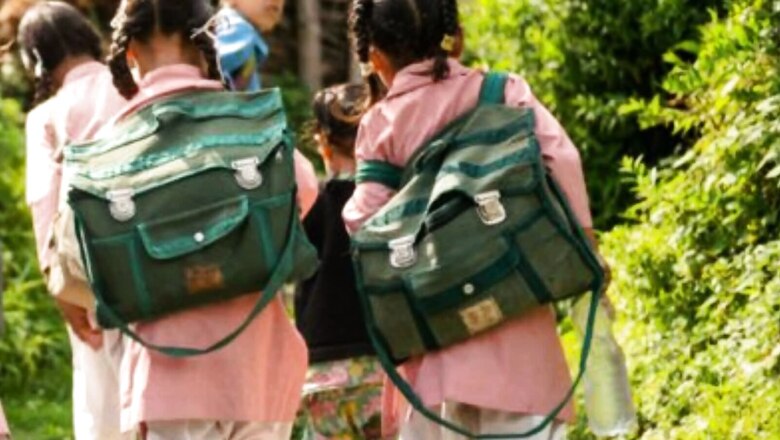
views
It was the evening of March 24, 2020, when the Prime Minister of India announced a lockdown for three weeks as a measure to prevent COVID transmission as well as to prepare us to fight it. Who would have thought that almost two years since then, a large number of our children would still find themselves locked out of schools? There have been many cycles of ‘restrictions’ and ‘opening up’ but unfortunately most schools and colleges are still waiting for their students to liven up classrooms and playgrounds.
India has created the unpleasant record of being among the few countries with longest periods of school lockdown due to COVID-19. In a country with the largest young population, this is not only unfortunate but has devastating consequences. It is not as if keeping schools closed is helping our fight against COVID in any significant manner. This decision (or rather indecision to open) is not based on any scientific logic but on undue apprehensions created by some ill-informed individuals or groups. There are countries like Denmark, Sweden and Portugal which have mostly kept their schools (particularly primary schools) open during the pandemic and yet they have not done any worse than the rest of the world in fighting the pandemic. Prolonged shutdown of schools and colleges has affected this generation adversely.
Impact of School Closure on Children
School is the place where a child grows. Schooling is not limited to studies but it helps in comprehensive growth and personality development of a child. Interaction with peers stimulate children to excel in studies and playing together helps in social and emotional development. No surprise that our children are losing a lot on many fronts over these two years.
UNESCO in its report has estimated that every month away from school results in a loss of two months of learning for a child. This means that many of our children have lost around 40 months of learning due to 20-month-long school closure. A similar study done by McKinsey stated that inability to attend schools in person was making children lag behind in academic milestones. There was higher impact on mathematical skills and children from disadvantaged groups were most affected.
Many other studies from different parts of world have come out with similar findings. A study was conducted by researchers at Universities of Essex, Surrey and Birmingham to assess the impact of school closure. Dr Birgitta Rabe, the lead researcher of the study, said: “Taken together, our results suggest that the effects of school closures on children’s wellbeing are large, and that they may take some time to mend. Going back to school in itself does not appear to be sufficient for children to ‘bounce back’. Additional support for children’s mental health and wellbeing is likely to be required for some time and justifies the focus that many schools have been placing on pupil wellbeing.”
To believe that online education can be an effective alternative to offline schooling is far from truth. Netherlands has one of the best broadband access systems in the world but a study conducted there concluded: “Despite favourable conditions, we find that students made little progress while learning from home. Learning loss was more pronounced among students from disadvantaged homes.”
In India, children are at greater disadvantage. Not all households have enough resources to provide online education to children. In semi-urban and rural areas, reach of online schooling is limited. It’s not that our political class is unaware of these facts. The Parliamentary Standing Committee on Education, Women, Children, Youth and Sports in its report last year stated that the impact of lack of schooling caused “not only learning loss but also loss of social contact and socialisation routine that were part of the daily experience of a student’s life in schools and educational institutions.” The report was mindful of greater impact on weaker sections as it stated: “Past evidence suggests that short-term disruptions in schooling often lead to permanent dropouts amongst these categories. This needs to be addressed and immediate remedial steps required to be taken.”
While impact of prolonged shutdown of schools on education and learning is easily visible, it is the impact on physical and mental health of children, which is of greater consequence. Psychosocial issues in children like anxiety, stress and depression are being seen more commonly by doctors. Lack of outdoor activities and long hours of screen exposure are leading to a rise in cases of childhood obesity and eyesight weakness. Children are engulfed in a fear of unknown and are losing confidence and self-esteem.
Is It Time to Open Schools?
We are late as time to open schools was long ago. A significant damage has already been done and any further delay will only worsen the situation.
UNICEF is very clear in its recommendations to open schools without further delay. Expressing its concern on prolonged shutdown of schools, it stated: “This should not go on. Schools should be the last to close and the first to reopen.”
“In their efforts to limit transmission, governments have too often shut down schools and kept them closed for prolonged periods, even when the epidemiological situation didn’t warrant it. These actions were frequently taken as a first recourse rather than a last measure. In many cases, schools were closed while bars and restaurants remained open.”
It further states: “The losses for parents and caretakers are equally heavy. Keeping children at home is forcing parents around the world to leave their jobs, especially in countries with no or limited family leave policies. That’s why reopening schools for in-person learning cannot wait.”
Third wave has peaked in our country and in many areas like Delhi-NCR, it has receded. With its very high infectivity, Omicron has infected a large proportion of our population. This has created a good herd immunity and has worked as vaccination for children who are not yet eligible to take the vaccine. This itself makes it the least risk period to open schools.
Is Vaccination a Prerequisite to Open Schools?
While teachers and support staff at school should be vaccinated, vaccination to children is not a prerequisite to open schools. Children have got some natural protection against severity of disease. Experience of last two years suggests that chances for a child to be hospitalised with COVID infection are much lower if we compare it against other childhood diseases like dengue, typhoid or bronchiolitis. Whenever vaccines are available for different age groups of children, they can be vaccinated but that should not be a hindrance to attend the schools.
UNICEF is also recommending the same: “UNICEF supports the vaccination of children once vaccines are available to them and once priority groups are fully protected. Do not make vaccination a pre-requisite for in-person schooling.”
The Way Forward
We should be opening our schools without any delay. Most states where schools have started reopening are leaving primary classes out. This is not based on any scientific logic. Ideally it should be the other way around where primary schools should be the first to open. Since we have lost a lot of precious time, there is no need to be graded in our approach now. Primary schools should open immediately along with higher classes. We should also move away from any restrictions or conditions like mandatory use of mask or overzealous use of sanitizers in schools, as these measures are less likely to make any significant difference. Many European countries have realised this and are moving in that direction. Schools should provide transportation just like pre-COVID times. If we enforce too many restrictions and create apprehensions, it will defeat the purpose.
A normal schooling experience just like pre-COVID times is need of the hour.
Dr Prabhat Maheshwari, MD, DNB, MRCPCH, is Chief, Pediatric and Neonatal Intensive Care, Artemis Hospital, Gurugram. The views expressed in this article are those of the author and do not represent the stand of this publication.
Read all the Latest Opinions here


















Comments
0 comment